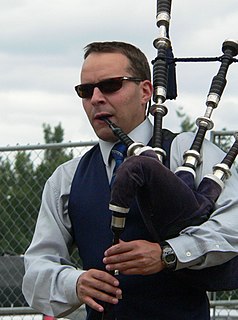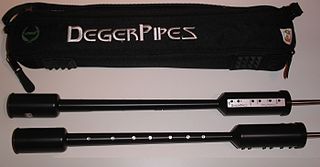
Bagpipes are a woodwind instrument using enclosed reeds fed from a constant reservoir of air in the form of a bag. The Scottish Great Highland bagpipes are the best known examples in the Anglophone world, but people have played bagpipes for centuries throughout large parts of Europe, Anatolia, the Caucasus, Northern Africa, Western Asia, and around the Persian Gulf.

The uilleann pipes are the characteristic national bagpipe of Ireland. Earlier known in English as "union pipes", their current name is a partial translation of the Irish-language term píobaí uilleann, from their method of inflation. There is no historical record of the name or use of the term uilleann pipes before the 20th century. It was an invention of Grattan Flood and the name stuck. People mistook the term 'union' to refer to the 1800 Act of Union; this is incorrect as Breandán Breathnach points out that a poem published in 1796 uses the term 'union'.

The Great Highland bagpipe is a type of bagpipe native to Scotland. It has acquired widespread recognition through its usage in the British military and in pipe bands throughout the world.
The border pipes are a type of bagpipe related to the Scottish Great Highland Bagpipe. It is perhaps confusable with the Scottish smallpipe, although it is a quite different and much older instrument. Although most modern Border pipes are closely modelled on similar historic instruments, the modern Scottish smallpipes are a modern reinvention, inspired by historic instruments but largely based on Northumbrian smallpipes in their construction.

Leo Rowsome was the third generation of an unbroken line of uilleann pipers. He was a performer, manufacturer and teacher of the uilleann pipes throughout his life.
Pibroch, piobaireachd or ceòl mòr is an art music genre associated primarily with the Scottish Highlands that is characterised by extended compositions with a melodic theme and elaborate formal variations. Strictly meaning "piping" in Scottish Gaelic, piobaireachd has for some four centuries been music of the Great Highland Bagpipe. Music of a similar nature, pre-dating the adoption of the Highland pipes, has historically been played on the wire-strung Gaelic harp (clarsach) and later on the Scottish fiddle, and this form is undergoing a revival.
The Army School of Bagpipe Music and Highland Drumming is a British Army training establishment that provides instruction on Scottish pipe band music to military pipers and drummers.

The pastoral pipe was a bellows-blown bagpipe, widely recognised as the forerunner and ancestor of the 19th-century union pipes, which became the uilleann pipes of today. Similar in design and construction, it had a foot joint in order to play a low leading note and plays a two octave chromatic scale. There is a tutor for the "Pastoral or New Bagpipe" by J. Geoghegan, published in London in 1745. It had been considered that Geoghegan had overstated the capabilities of the instrument, but a study on surviving instruments has shown that it did indeed have the range and chromatic possibilities which he claimed.

Jori Lance Chisholm is an American professional bagpipe player and teacher who lives in Seattle, Washington. Chisholm is a successful solo competitor winning the United States Gold Medal four times and has placed in the top three in Scotland's Argyllshire Gathering Gold Medal competition. He played with the six-time Grade One World Champion Simon Fraser University Pipe Band and was a featured solo performer for the band on multiple occasions. Chisholm has performed in front of sold-out audiences with The Chieftains and with ex-Grateful Dead rocker Bob Weir and his band Ratdog, and has been featured as a soloist or band member on over 20 recordings. His debut solo album Bagpipe Revolution was nominated for Album of the Year by Pipes|Drums magazine. He writes the "Sound Technique" column for the National Piping Centre’s bi-monthly Piping Today Magazine. The New York Times featured Chisholm's online teaching program, BagpipeLessons.com, and described him as a "top-tier teacher" in a front-page story about the growth of Skype music lessons. A cover story in American Profile Magazine named Chisholm one of the "world's elite pipers."

Welsh bagpipes The names in Welsh refer specifically to a bagpipe. A related instrument is one type of bagpipe chanter, which when played without the bag and drone is called a pibgorn (English:hornpipe). The generic term pibau (pipes) which covers all woodwind instruments is also used. They have been played, documented, represented and described in Wales since the fourteenth century. A piper in Welsh is called a pibydd or a pibgodwr.
This article defines a number of terms that are exclusive, or whose meaning is exclusive, to piping and pipers.

The electronic bagpipes is an electronic musical instrument emulating the tone and/or playing style of the bagpipes. Most electronic bagpipe emulators feature a simulated chanter, which is used to play the melody. Some models also produce a harmonizing drone(s). Some variants employ a simulated bag, wherein the player's pressure on the bag activates a switch maintaining a constant tone. As with other electronic musical instruments, they must be plugged into an instrument amplifier and loudspeaker to hear the sound. Some electronic bagpipes are MIDI controllers that can be plugged into a synth module to create synthesized or sampled bagpipe sounds.

Fred Morrison is a Scottish musician and composer. He has performed professionally on the Great Highland Bagpipes, Scottish smallpipes, Border pipes, low whistle, Northumbrian Smallpipes and uilleann pipes.
The College of Piping was founded in Glasgow, Scotland, in 1944 by Seumas MacNeill and Thomas Pearston to pass on the art of the Great Highland Bagpipe to all who wanted to learn Scotland's national instrument. As well as teaching, the College's aims were/are to preserve the heritage of the bagpipe by collecting piping artefacts, manuscripts and memorabilia and by providing a focal point for pipers the world over. College lessons are subsidised by profits from the College Shop which sells instruments, music, Highland wear and bagpipe accessories. A charity, the College often teaches students of low means for free.
Na Píobairí Uilleann is a non-profit organization dedicated to the promotion of the Irish Uilleann pipes and its music.

Irish warpipes are an Irish analogue of the Scottish Great Highland Bagpipe. "Warpipes" is originally an English term. The first use of the Gaelic term in Ireland was recorded in a poem by Seán Ó Neachtain, in which the bagpipes are referred to as píb mhór.
Gordon Walker is a bagpiper.
Donald MacPherson was a Scottish bagpipe player, and one of the most successful competitive solo pipers of all time.









